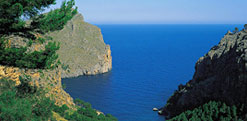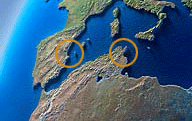Castor UGS Limited Partnership and the Castor Project
The Castor Project was a Spanish infrastructure undertaking that converted an abandoned oilfield to a natural gas storage facility. The Castor Project, and the related exploitation concession, were owned and developed by Escal UGS S.L. (“Escal”), a company incorporated under Spanish jurisdiction. ACS Servicios Communicacions y Energy S.L. (“ACS”), a construction group in Spain, is a 67% shareholder of Escal, while Castor UGS Limited Partnership (“CLP”), the Corporation’s 74% owned subsidiary, holds the remaining 33% interest in Escal.
Escal drilled 12 offshore wells and completed construction of offshore and onshore facilities in 2013. Subsequent to the injection of natural gas into the reservoir in September 2013 micro-seismic activity was detected in the area surrounding the Castor Project. Although the seismic activity did not affect the integrity of the facilities or underground reservoir, the Spanish authorities mandated suspension of activities at the Castor Project.
Escal subsequently considered options available in respect of the Castor Project and, in July 2014, determined that it was appropriate to exercise its right under the underground gas storage concession to relinquish the concession to the Spanish authorities. On October 3, 2014, the Spanish government approved Royal Decree-Law 13/2014, which became effective on October 4, 2014, the date of its publication in the Spanish Official State Gazette. The Royal Decree-Law formally accepted the relinquishment of the Castor Project, it acknowledged the termination of the concession, and it reverted ownership of the associated facilities back to the public domain.
Under the terms of the relinquishment, Escal was entitled to receive compensation equal to the net value of its investment in the Castor Project, which the Spanish authorities determined to be €1.46 billion. In addition to the net value of its investment as outlined above, the Royal Decree-Law provided Escal with additional remuneration rights, namely financial remuneration for the period from the provisional commissioning date of the Castor Project on July 5, 2012 through to October 4, 2014, as well as the reimbursement of operating and maintenance costs incurred during this period.
In November 2014, Escal received €1.35 billion, being the net value of its investment after deducting amounts previously received during the pre-commissioning stage of the development. These proceeds were applied towards the partial repayment of the €1.41 billion of outstanding bonds issued by Escal through a financing vehicle.
Also in November 2014, ACS arranged a new €300 million bank financing for Escal, of which €60 million was applied to repay the balance of amounts owing pursuant to the outstanding bond financing. The remainder was used to repay shareholders loans, solely to ACS. CLP is of the view that not only was the above transaction against the corporate interests of Escal, but it also ignored CLP’s ownership rights in the equity and shareholder loans of Escal, which are, in CLP’S opinion, established in the 2007 Memorandum of Understanding between CLP and ACS. Consequently, CLP has lodged a legal action challenging the approval of the new bank financing by the Board of Directors of Escal, and additionally, it has commenced binding arbitration proceeding against ACS under the auspices of the International Chamber of Commerce in Paris in order to resolve the dispute between the parties.





